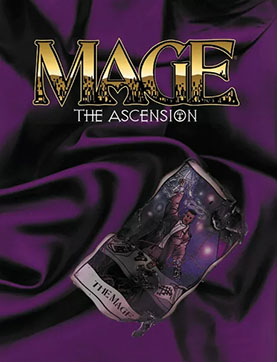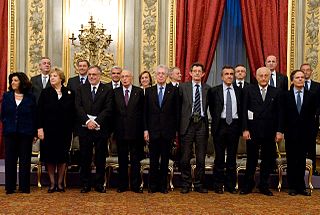
Mage: The Ascension is a supernatural fiction tabletop role-playing game first published on August 19, 1993, by White Wolf Publishing. It is set in the World of Darkness universe.
Mage most commonly refers to:

Time of Judgment is a series of roleplaying game scenario books for the World of Darkness settings of White Wolf Game Studio. These scenarios are presented as the semi-canonical endings of the original World of Darkness, as preparation for the new version of the setting. As the Time of Judgment approaches, vampires cease to exist, werewolves fight their last battle against the Wyrm, and mages face their last test.

The technocracy movement was a social movement active in the United States and Canada in the 1930s which favored technocracy as a system of government over representative democracy and concomitant partisan politics. Historians associate the movement with engineer Howard Scott's Technical Alliance and Technocracy Incorporated, prior to the internal factionalism that dissolved the latter organization during the Second World War. Technocracy was ultimately overshadowed by other proposals for dealing with the crisis of the Great Depression. The technocracy movement proposed replacing partisan politicians and business people with scientists and engineers who had the technical expertise to manage the economy. But the movement did not fully aspire to scientocracy.
Technocracy is a form of government in which the decision-makers are selected based on their expertise in a given area of responsibility, particularly with regard to scientific or technical knowledge. Technocracy follows largely in the tradition of other meritocracy theories and assumes full state control over political and economic issues.

Howard Scott was an American engineer and founder of the Technocracy movement. He formed the Technical Alliance and Technocracy Incorporated.
Phil "Satyros" Brucato is an American writer, journalist, editor, and game designer based in Seattle, Washington. He is best known for his work on the TV series Strowlers and with White Wolf, Inc., including the role-playing games Mage: The Ascension, Werewolf: The Apocalypse, and Mage: The Sorcerers Crusade. He has also written articles for BBI Media's newWitch and Witches & Pagans magazines, as well as other media such as Deliria: Faerie Tales for a New Millennium, the urban fantasy webcomic Arpeggio, and various short stories. Additionally, he has founded Quiet Thunder Productions and is a member of the Wily Writers group.
Walter Rautenstrauch (1880–1951) was an American mechanical and consulting engineer, and Professor at Columbia University's Department of Industrial Engineering in the 1930s. He coined the term break-even point, and developing the break-even chart together with Charles Edward Knoeppel.
Vaine Wilton Ivie was an American arachnologist, who described hundreds of new species and many new genera of spiders, both under his own name and in collaboration with Ralph Vary Chamberlin. He was employed by the American Museum of Natural History in New York. He also was a supporter of the Technocracy movement.
A craft is an occupation or trade requiring manual dexterity or artistic skill.
Traditions are customs practiced from one generation to the next.
Awaken or Awakened may refer to:
Necronaut is a term derived from the Greek words nekros (νεκρός), meaning "corpse" or "dead", and nautes (ναύτης), meaning "sailor". It may refer to:
The Technical Alliance was a group of engineers, scientists, and technicians based in New York City, formed towards the end of 1919 by American engineer Howard Scott. The Alliance started an Energy Survey of North America, aimed at documenting the wastefulness of the capitalist system.
Frederick L. Ackerman (1878–1950) was an architect and housing reformer in the United States. He supported proactive engagement of the federal government to supply quality housing for the working class. He participated in the federal government's earliest housing program with architects Clarence S. Stein and Henry Wright on their projects Sunnyside (1924) and Radburn (1928), and worked for the New York City Housing Authority. While he favored traditional architecture and lower income housing, he also designed modernist buildings, luxury apartment buildings and home designs. Ackerman graduated from Cornell University in 1901 and designed Balch Hall on campus in 1929. He also designed Day Hall, Cornell's main administrative building, in 1947.

In Italy, a technocratic government, technical government or government of technicians, is the term used to refer to a cabinet made up of experts not officially affiliated to any political party or political coalition. Technocracy in Italy, as elsewhere, has often proved to be controversial. These governments tend to be formed during emergencies, usually an economic crisis, and are seen by some as undemocratic. There have been two such governments in the history of Italy: the Dini Cabinet, and the Monti Cabinet.
Techno-populism is either a populism in favor of technocracy or a populism concerning certain technology – usually information technology – or any populist ideology conversed using digital media. It can be employed by single politicians or whole political movements respectively. Neighboring terms used in a similar way are technocratic populism, technological populism, and cyber-populism. Italy's Five Star Movement and France's La République En Marche! have been described as technopopulist political movements.

The Fragile Path: Testaments of the First Cabal is an epic poem written by Phil Brucato, Laura Perkinson, James A. Moore, Nancy Kilpatrick, Tina Jens, Beth Fischi, and Owl Goingback. It was published by White Wolf Publishing in 1995, and is based on the tabletop role-playing game Mage: The Ascension and the World of Darkness series.

Le Monde des Ténèbres: France is a tabletop role-playing game supplement published in French by Ludis International in January 1997, for use with the games in White Wolf Publishing's World of Darkness series. It interprets France for the series' gothic-punk setting, and presents information on the region related to vampires, werewolves, mages, wraiths, and changelings, along with story hooks and pre-made characters, and introduces two new types of fae to the series. Ludis International planned to follow it with a book about Paris in June 1997, but this never materialized, and the publisher closed down a year later.





